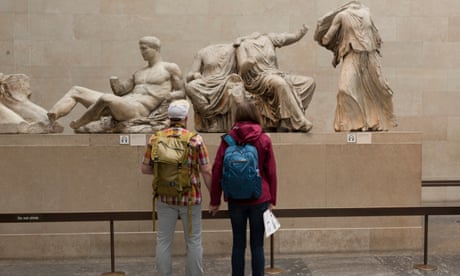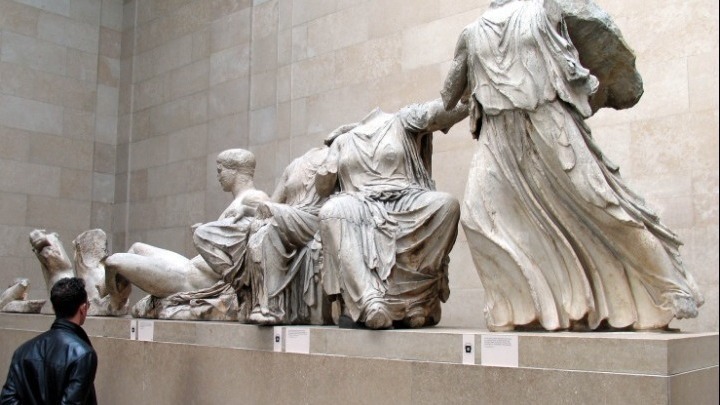The Guardian: Δώστε τα μάρμαρα του Παρθενώνα πίσω στην Ελλάδα
Η έγκυρη βρετανική εφημερίδα “The Guardian” συνηγορεί υπέρ της επιστροφής των Γλυπτών του Παρθενώνα από την Βρετανία στην Ελλάδα. Ο αρθρογράφος της εφημερίδας Simon Jenkins μεταξύ άλλων τονίζει:
“Όποιος έχει δει το άλλο μισό της ζωφόρου του Παρθενώνα, που τώρα εκτίθεται στο υπέροχο Μουσείο της Ακρόπολης της Αθήνας, θα συμφωνήσει ότι αυτός ο μεγαλύτερος ευρωπαϊκούς θησαυρούς δεν πρέπει να τεμαχιστεί και να μοιραστεί μεταξύ Αθήνας και Λονδίνου. Ανήκει εκεί που δημιουργήθηκε, ακτινοβολεί στο ελληνικό φως και απλώνεται μπροστά στον αρχικό ναό του. Το μισό από αυτό δεν πρέπει να κάθεται, παγωμένο και εκτός πλαισίου, σε ένα ζοφερό μαυσωλείο του Bloomsbury”.
*Διαβάστε το άρθρο:
Give the Parthenon marbles back to Greece – tech advances mean there are no more excuses

One day a British government will return the Parthenon marbles to Athens. The only question is: who will obtain Greece’s undying credit and thanks?
The obvious candidate was surely Boris Johnson. In 1986, the classics scholar invited the Greek culture minister Melina Mercouri to speak at Oxford University, pledging to help her restore the Parthenon’s glory. Yet this week it became yet another of Johnson’s Don Giovanni promises – words meant only at the time. Visiting London earlier this week, the Greek prime minister, Kyriakos Mitsotakis, challenged him to “think out of the box in terms of global Britannia” and stage a “fantastic coup for public diplomacy”. Johnson pretended the issue was for the British Museum to decide, and nothing to do with him.
Anyone who has seen the other half of the Parthenon frieze, now on display in Athens’ magnificent Acropolis Museum, will agree that this greatest of European treasures should not be cut up and divided between Athens and London. It belongs where it was created, radiant in the Greek light and laid out within sight of its original temple. Half of it should not be sitting, frigid and out of context, in a bleak Bloomsbury mausoleum.
The Parthenon marbles saga has lately become enveloped in a wider debate over cultural identity and restitution. The British Museum has long argued, for a time powerfully, that its amassing of global artefacts over two centuries of British empire has delighted and educated tourists to London. The marbles were not looted but were cut from the Acropolis between 1801 and 1805 by the British ambassador to the Ottoman Empire, Lord Elgin, with permission from Greece’s then conquerors, the Turks. No one asked the Greeks, but otherwise it was legal.

The British Museum now protests that what it has, it holds with care. Yes, it did come close to wrecking the marbles when cleaning them with wire brushes in 1938, but at least they were safe from war and pollution. The whole world can get to London to see them, rather than traipsing to a distant Balkan capital, the museum says; we don’t want to open the floodgates to every tinpot regime seeking to boost its cultural image by raiding London basements for ancestral stuff. Museum curators love worst-case scenarios.
Yet the world is moving on. Cultures are craving their homelands, settings, identities. Museums across Africa and Asia are improving. They are seeking to rediscover and interpret their ancient narratives. Surely we should respect rather than impede this desire. There may be no rules governing the restitution of museum objects, but dealings between peoples require qualities of courtesy, generosity and common sense.
To be fair, western museums are responding. Paris is returning looted artefacts to south-east Asia and Senegal. Benin bronzes have been returned to Nigeria from Cambridge, Aberdeen, Germany and France. The British Museum returned royal jewels to Ceylon in the 1930s and regalia to Burma in 1964. It even returned part of the Sphinx’s beard to Egypt. To circumvent rules forbidding “deaccessioning”, these moves are often couched as “permanent loans”.
In 1941, during the second world war, the British Foreign Office actively considered the Parthenon marbles’ return as a gesture of support for Greek nationalism, as and when the war should end. The British Museum has occasionally mooted lending them to Athens for an exhibition, but does not trust the Greeks to return them. Nor is it moved by Greek offers of sumptuous objects lent in return, such as the golden Mask of Agamemnon.
This debate has been further transformed by developments in replication. Computerised 3D printing and etching pioneered in Italy and at Oxford’s Institute for Digital Archaeology can now recreate with microscopic accuracy ancient buildings and statues, even using the original stone. There are plans to “reprint” Palmyra’s Temple of Baal, destroyed by Islamic State in 2015, and replicate monuments tragically lost in Mosul and Nimrud.
The Parthenon marbles could now be reproduced as indistinguishable from the originals, even if snooty art critics can dismiss them as fakes and “not the same thing”. This then raises the question of which museum, London or Athens, should get the “originals” – and does it really matter? We can admire the second casting of a Rodin statue or the fourth state of a Rembrandt etching as much as a first. Who cares?
To this there is only one answer: that the Greeks do care. The missing Parthenon frieze in its original state is a reminder of the country’s humiliation by the Turks, and by a British aristocrat. They feel these stones are theirs, just as the Stone of Scone belongs to Scotland, and Stonehenge would “belong” to every Briton, had the Emperor Claudius decided to cart it back to Rome. If Londoners want to experience the aesthetic appeal of Greek carving, they can: technology can replicate it for them, as it is now replicating famous statues across Europe. But let the stones return.
This issue, so important to the Greeks but not to the British, could be sorted out with goodwill in an instant. Precisely such a negotiation on the marbles was demanded in September by Unesco, and rejected by Britain. If it requires a “perpetual loan” or an act of parliament, then get on with it. If money is required, raise it. Johnson is being feeble in fobbing off Athens’ request as not being under his purview. The museum is a state institution. Instead of keeping his promise and doing the right thing by the marbles, he has performed another U-turn and funked it.
*Simon Jenkins is a Guardian columnist




